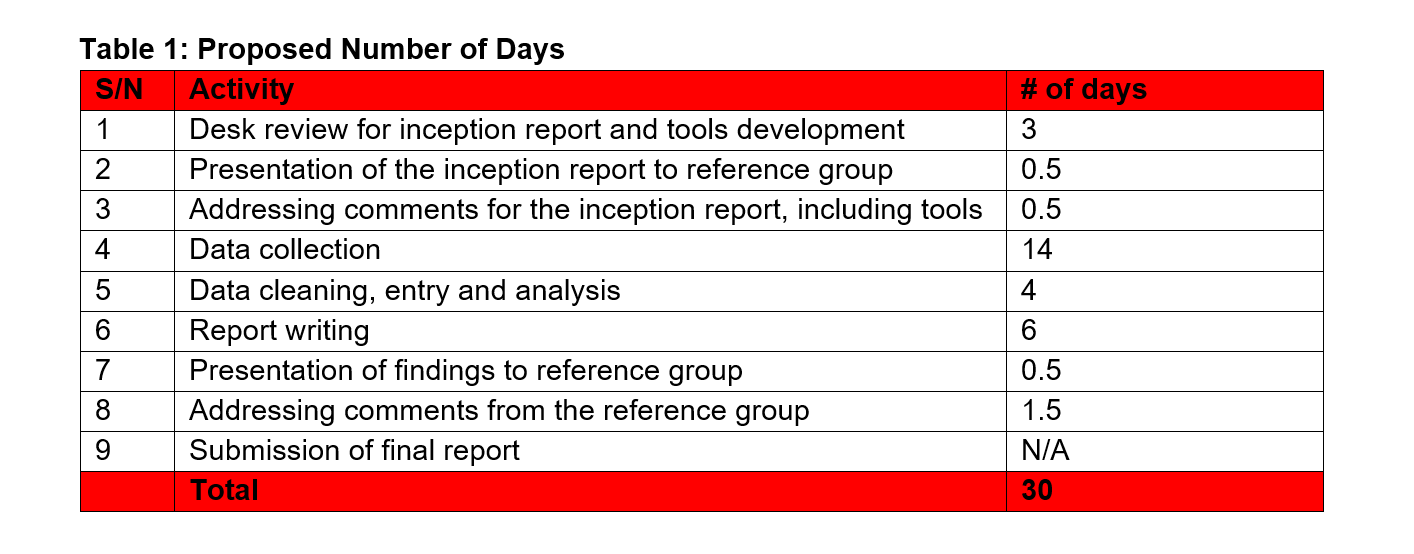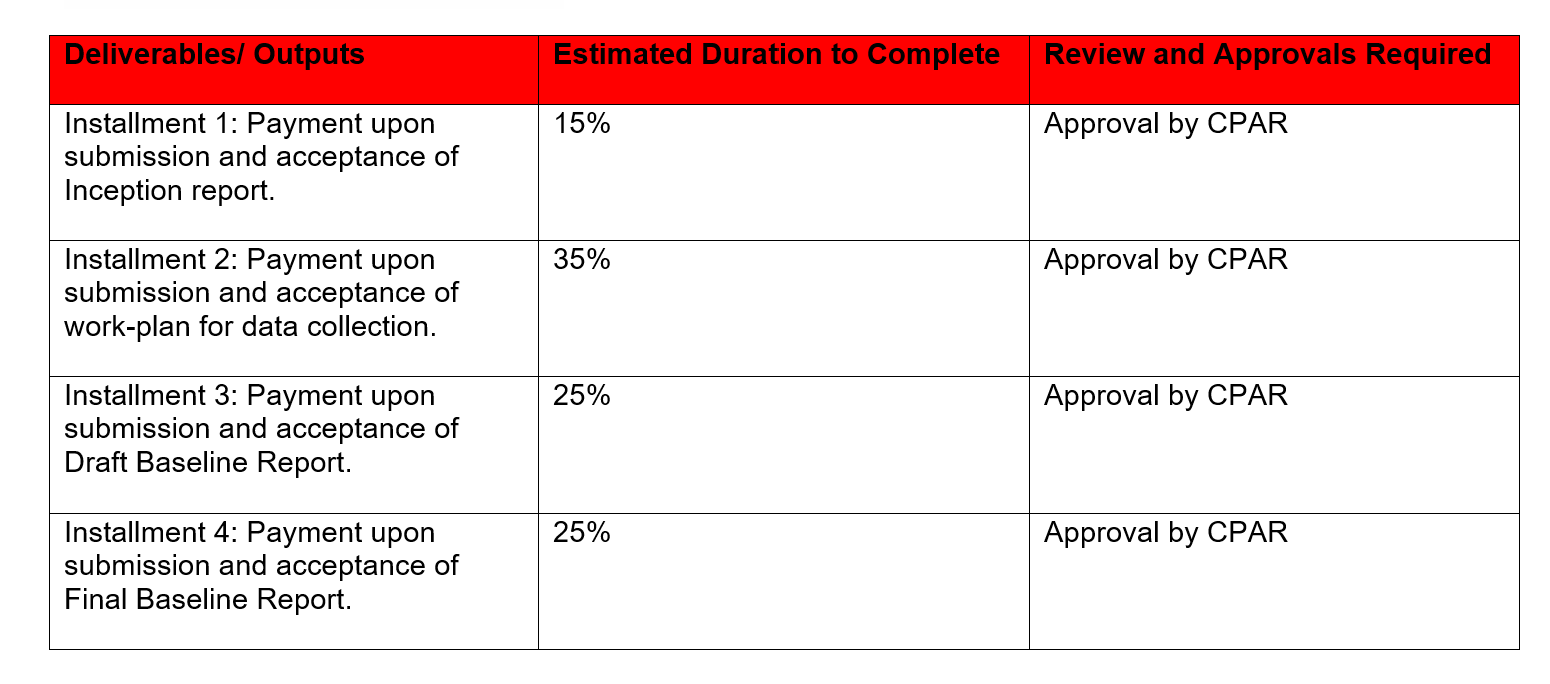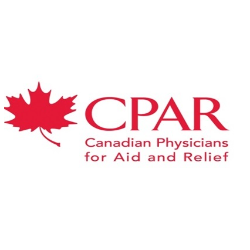Terms of Reference (TOR)
Baseline Study for CPAR’s GAC-funded Project in Tanzania.
Terms of Reference (TOR)
Baseline Study for CPAR’s GAC-funded Project in Tanzania.
Project Title – Accessible and Effective ANC and SRHR for Women and Girls in Rural Tanzania
Project Background
Tanzania has significantly reduced maternal mortality from 556 per 100,000 live births (TDHS, 2015/2026) to 104 per 100,000 live births (TDHS, 2023). Despite the significant achievement, no single preventable maternal death is acceptable. A variety of factors, including poor maternal health service quality, insufficient intervention coverage, particularly in rural and marginalized communities, inadequate infrastructure and referral systems have since adversely affected these gains.
Due to a severe shortage of specialists, mostly located in tertiary care facilities in urban centers, as well as an insufficient referral system between health facilities, gestational age and high-risk pregnancies are not identified in time, and women are not referred to an appropriate facility. If pregnant women had access to basic antenatal care (ANC), such as antenatal ultrasound, many of these deaths and health complications could be avoided. The World Health Organization recommends that pregnant women should have at least four ultrasounds, including one early ultrasound to estimate gestational age, detect fetal anomalies and multiple pregnancies, which can lead to fewer pre-term and risky post-term births and obstetrical complications. However, according to national statistics covering the years 2019-2021 in the districts where the project will be implemented, only 5% of pregnant women in Karatu district and 1% in Mbulu district received ultrasounds.
However, lack of ultrasound in rural areas, a scarcity of obstetricians in rural areas, high travel costs to larger hospitals, and an ineffective referral system are not the country’s only barriers to effective ANC. According to the literature and our own gender-based analysis (GBA), barriers to ANC use are multifaceted, including lack of community support systems and cultural and religious barriers. Untrained traditional birth attendants with a financial incentive to discourage ANC spread misinformation about the safety of ultrasounds and the need for ANC; there is cultural resistance among women (accessing ANC is perceived as a sign of weakness); and among men, often the health decision makers for the family, sometimes are develop negative attitudes toward women accessing ANC suspected to be due to time and money required for travel paired with often decreased value or importance of general healthcare needs for females.
Project Objectives
The overall objective is to improve maternal and newborn health among rural populations in selected districts of Tanzania.
Specific Objectives: (i) increased utilization of comprehensive ANC, including routine ultrasound; (ii) increased awareness of ANC, contraception, sexual reproduction and health rights (SRHR), gender- based violence (GBV) and related issues amongst women, men, and adolescent girls and boys; and (iii) effective adoption and integration of innovative ANC technology and practices into existing health systems.
Target Beneficiaries: 227,000 women and adolescent girls of child-bearing age (15-49), who will receive comprehensive mobile ANC services in addition to age- and gender-sensitive education on family planning, modern contraception, and SRHR including GBV. Because improved maternal health benefits families and communities and improves economic outcomes, the project will also benefit 210,000 men and adolescent boys indirectly. Radio campaigns will reach an additional 4 million people.
Geographical Coverage:
The project will be implemented in Karatu District of Arusha region and Mbulu district(Mbulu Town Council and District Council) of Manyara region.
Project Consortium:
The project shall be implemented by CPAR together with: Ministry of Health-District/Town Medical Office,
UMATU (Upendo na Matumaini), a women led community based organization working on HIV and gender related issues. UMATU envisions all people living with HIV live “positively,” and as respected and fully functioning members of society.
Justification for the Baseline Study:
The project has defined its targets and indicators in its log frame but the baseline of several of the projected targets are currently unavailable. Therefore, to create the benchmarks, a baseline survey is necessary to identify the baseline indicators for each of the set outputs and outcomes. These baseline indicators will be the guiding pillars to measure the project’s achievements and outputs towards the end. This will also help to develop an appropriate monitoring tool for M&E of project interventions to reach the stated outputs & achievements. Furthermore, the baseline survey will generate and develop an information base comprising of detailed and relevant information of the general and targeted beneficiaries. This information will guide us to plan effectively and coherently in realizing the project goals in a systemic way.
Objectives of the Baseline Study:
The main objective of the baseline study is to prepare a pre‐project / baseline information of the target beneficiaries as per the indicators of project objectives, specific objectives and expected results specified in the project document and the project log‐frame.
Specific objectives of the baseline study include:
a) To collect and analyze the verifiable indicators from the project log frame.
b) To collect and analyze the relevant information of existing situation of project’s targeted beneficiaries
Supervisory Arrangements:
The consultant(s) will be directly supervised by the Project Manager.
Scope of the Assessment: The consultant will be provided with a refined results framework with indicators that will be applied to benchmark. The selected consultants are expected to conduct interviews with key informants from selected training institutions, health care workers, the Ministry of Health, PORALG, local government officials from selected districts and health facilities, Community Health Workers, as well as community structures representatives; and conduct facility assessments through direct observation. The consultants will gather secondary data from the selected districts as well as at the national level as necessary. Focus group discussions with community members, particularly community leaders, women, men, first-time young mothers, and male and female adolescents/youth, will be conducted.
The consultants are expected to propose approaches and methodologies to achieve the objectives mentioned in the project proposal.
Expected Deliverables:
- Inception report containing a detailed work plan for the entire duration of the consultancy, data collection tools, sampling frame and final baseline report outline to be submitted and presented in a week’s time following the signing of the agreement.
- Draft baseline report validated with key stakeholders.
- Final baseline report in electronic and a standard outline format.
- Dataset in Excel format and transcribed qualitative information in a Word format.
The Team Leader:
Responsible for the overall assessment and deliverables process, designing of the data collection tools, and methodologies required for collecting information. The team leader will ensure the designed and final baseline reports are prepared and shared as per the agreed timeline. They will lead and coordinate the assessment team’s work during all phases of the assessment and be responsible for the quality assurance of all deliverables. They will liaise with CPAR’s Project Manager and reference group to ensure the goals of the project are well addressed.
Team Members:
Will support the team leader in data collection, contribute to data analysis, design, and final report writing, and provide expertise in midwifery workforce education and training in line with international and national standards.
Team Leader Qualifications:
- A master’s degree in one or more of the disciplines relevant to the following areas: Public health, Monitoring and Evaluation, and/or other health-related academic qualifications.
- At least ten (10) years of recognized experience in conducting or managing evaluations or reviews of development programs.
- Extensive experience with Tanzania’s health systems and exposure to working in or with the health sector, including developing policy documents and evaluation.
- Experience in the evaluation of similar projects and should provide at least one recent report.
- Expertise in quantitative and qualitative evaluation/research methods.
- Excellent analysis skills in writing evaluation reports with constructive and practical recommendations.
- Fluency in written and spoken English. Knowledge of Kiswahili will be an asset.
Duration of the Consultancy:
The duration of the consultancy is scheduled to last no more than 30 days to be completed within a period of three months. The study is expected to begin in October 2024.
The proposed working schedule is outlined in the table below:

Responsibilities of Consultants/Scope of Work:
The composition of the study team is determined by the consultant/organization based on their internal system, ideas and logic. However, CPAR recommends that the team is comprised of one Team Leader (TL) to coordinate/conduct the overall study and liaise with CPAR. Supervision of the field work and quality (reliability and validity) of the data/information collected from the field is the primary responsibility of the TL. The TL will report directly to the Country Manager of CPAR Tanzania and work closely with CPAR’s M&E/Project Manager. In each step and process, consultations with the Country Manager and M&E Manager are vital.
The Consultancy / Consultant Team Responsibilities:
- Develop/design baseline study, including questionnaire for household survey, and checklist and tools for group interaction including focus group discussions with target beneficiaries.
- Mapping PMF indicators to baseline for program capacity to develop targets.
- Consulting with women’s organizations and community leadership to access & inform indicator data and ensure efficacy of indicator specific data.
- Engagement of direct beneficiaries and intermediaries for indicators and apply a technical rational for the sample size selected.
- Share study design including process, methods and questionnaires/checklist with project team, collect feedback and finalize the study design.
- Pre‐test questionnaires and other tools in one of the project sites.
- Submit inception report.
- Debrief/discuss with project team about effectiveness of questionnaire, checklists and other tools used in pre‐test, collect feedback and finalize them.
- Orient, train and supervise the enumerators.
- Carryout field work together with enumerators.
- Ensure the quality of information collected from fields, cross check with the validity of information collected and verify/revise where needed.
- Update progress of the study on weekly basis for M&E Officer.
- Analyze data and prepare quality report.
- Give presentation of draft report to CPAR.
- Submit final report (a compiled version of the report ‐ both hard copy and electronic version in Word format) to the project after incorporating the feedbacks and suggestions from CPAR.
Deliverables:
The following deliverables are envisioned under this ToR:
- Addition of data as per indicator disaggregation in the baseline column of the project PMF document, Annex A.
- Hard copy of the final Baseline report.
- An e‐copy of raw data and final version of the report.
Eligibility Criteria:
The consultancy / consultant team should have experience in qualitative and quantitative research; clear understanding on research methodology and experiences on using different social research tools and techniques.
Work Schedule:
Details will be worked out jointly with the consultant team and project staff. However, the work is expected to commence from 26th October, 2024 for an estimated 30 days period.
Payment Schedule:
The successful consultancy team shall receive payments upon certification of the completed tasks satisfactorily, as per the milestones shown below:

The Expression of Interest should include:
– Resume/CV
– References and/or sample(s) of past work
– A proposal indicating competence for the required work, professional fee, brief outline of approaches/methodologies and timeline based on the Terms of Reference.
Please submit your application via [email protected] by 22nd October 2024.

